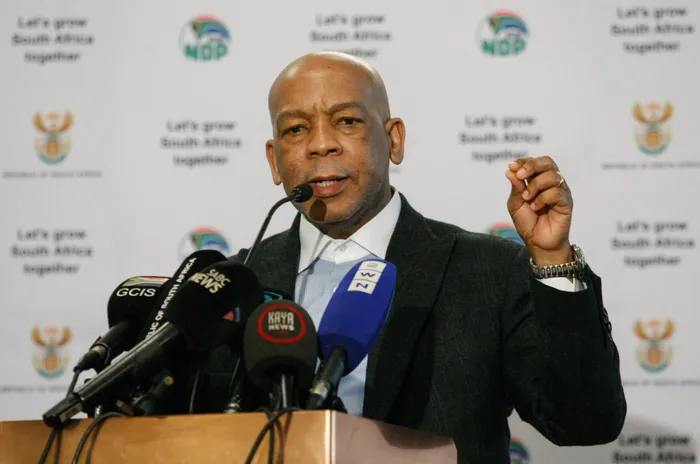Reviving SA’s nuclear future: A path forward

Minister of Energy and Electricity Kgosientsho Ramokgopa. Picture: Jacques Naude/Independent Newspapers
By Princess Mthombeni
The recent decision by Minister of Electricity and Energy Dr Kgosientsho Ramokgopa to withdraw the gazette for the procurement of 2 500 megawatts of nuclear power represents yet another setback in South Africa’s quest for energy security.
The decision, influenced by the DA’s legal challenge to the Section 34 Determination, underscores the challenges that have persistently hindered the advancement of nuclear energy in the country.
While the minister’s commitment to transparency in the nuclear sector is commendable, it is essential to address the recurring issues related to leadership, accountability and capacity that continue to impede progress in this critical area.
Leadership Challenges in South Africa’s Nuclear Sector
The South African nuclear industry must engage in a thorough self-assessment to realign with its mandate. A critical evaluation of achievements under the leadership is necessary, with the Nuclear Energy Policy of 2008 serving as a benchmark. The policy outlines a phased approach toward achieving national objectives in the nuclear sector, with the final phase set to conclude next year.
Phase 3 of the policy includes five key objectives:
1. Operation of new power plants.
2. Maintenance of nuclear infrastructure.
3. Local manufacturing of nuclear equipment and components.
4. Commercialisation of advanced nuclear energy systems.
5. Acceleration of research into further advanced nuclear energy systems.
When assessing the progress made under the current leadership on the strategic objectives, the results are evident. Unfortunately, the leadership has made significant progress only on objective 2, achieving about 50%.
Yet, in the other four strategic objectives, the leadership has fallen short, and with the withdrawal of the Section 34 Determination, there has been regression in certain areas.
Areas for Improvement in Leadership and Strategy
In 2022, the National Treasury introduced a green taxonomy, setting minimum standards for projects to be classified as environmentally friendly. Unfortunately, the industry leaders did not advocate for the inclusion of nuclear energy in this taxonomy, despite its environmental benefits.
Similarly, South Africa’s hydrogen strategy, now in the commercialisation phase, excludes nuclear energy, a clean energy option that other countries integrate with their Small Modular Reactors. The omission highlights a missed opportunity for the leadership to position nuclear energy as a key component of South Africa’s green hydrogen economy.
Furthermore, while South Africa has developed the Just Energy Transition (Jet) Framework and the Jet Investment Plan to support low-emissions development, there remains a lack of integration of nuclear energy into the initiatives. Numerous studies indicate that achieving decarbonisation by 2050 is unlikely without nuclear energy, yet the current leadership has not effectively advocated for its inclusion in the Jet plans.
In 2017, anti-nuclear NGOs successfully challenged the procurement process for 9 600MW of nuclear capacity, citing insufficient public consultation. The setback was a significant blow to the Integrated Resource Plan (IRP) 2010, which had anticipated the first unit coming online by 2023.
The leadership, facing challenges for failing to follow due processes in the procurement of 2 500MW, must address the underlying issues that leave the nuclear procurement process vulnerable to legal challenges.
The Need for Accountability and Strategic Renewal
The recurring procedural missteps and legal challenges in South Africa’s nuclear energy efforts raise concerns about the effectiveness and accountability of the industry leaders. The issues do not reflect the viability of nuclear energy itself but rather, a lack of strategic leadership and foresight within the government and its affiliated agencies.
The critical question is: Who is responsible for ensuring that proper procedures are followed to protect the minister and the integrity of the nuclear procurement process? The failure to adhere to proper procedures suggests a deeper issue within the administration – an absence of accountability and a lack of learning from past mistakes.
For South Africa to progress meaningfully in its nuclear journey, the cycle of failure must be addressed. It is imperative to rebuild the nuclear procurement process from the ground up, as was done with the IRP2010 and the 9 600MW project, to avoid similar difficulties in the future.
Conclusion: A Call for Innovative Approaches
It is crucial to hold the industry leaders accountable for past shortcomings and ensure that the lessons learnt from previous mistakes are applied in the new nuclear build procurement process. Cultivating a culture of accountability and rejecting complacency is essential to the stability and success of the nuclear industry.
As South Africa prepares for the next phase in its nuclear journey, it is time to embrace new ideas and innovative approaches. A different approach is necessary to ensure the future success of the nuclear programme and secure the country’s energy future.

Princess Mthombeni, an award-winning nuclear communicator and founder of Africa4Nuclear, writes in her role as a lifelong advocate for nuclear energy and co-ordinator for Stand Up For Nuclear South Africa.
BUSINESS REPORT